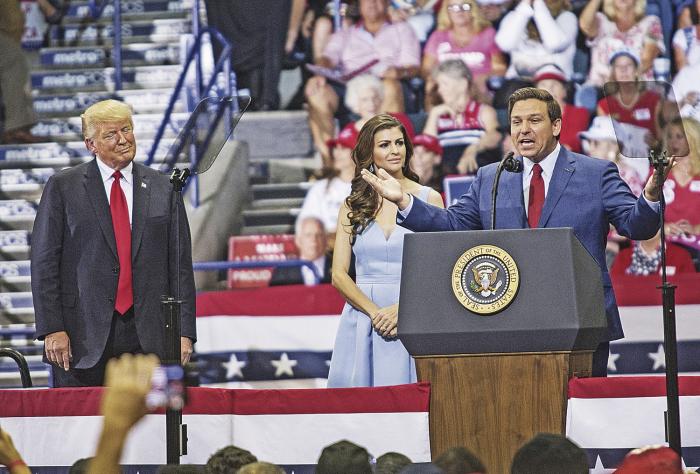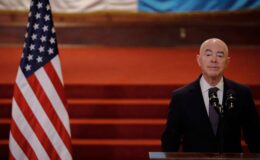Back at home, “Age” is a talking point of next election cycle
- By : James Bryson
- Category : Uncategorized, US News of note

In mid-November, Joe Biden became the first sitting President of the United States, having reached the age of eighty. A reality shared by Nancy Pelosi, who presided over the House of Representatives until her 82nd birthday, and by former President Donald Trump, who at 76 is emerging as a candidate for the US presidency in 2024, like Biden, who has already expressed his intention to run for re-election, despite not having made the official announcement.
This reality shows the aging of the leadership in the North American nation and that, in the opinion of the specialist Richard Morales, “expresses the petrification of very specific interests, which concentrate political power and networks of influence between large donors and high bureaucracy.”
Morales pointed out to “La Dean” that what is happening with the US leadership is a product of the polarization that that country is experiencing.
A survey carried out by the specialized center Pew Research Center in 2019, indicates that 76% of the electorate thinks that the country is divided, while 60% assures that both political parties (Republican Party and Democratic Party), have gone to the extreme, something that, in the opinion of 87% of those surveyed, threatens the lifestyle in that nation.

This polarization has increased the apathy of younger generations towards political issues, notes an article in The New York Times titled ‘Young Voters Are Fed Up With Their (Much) Older Leaders.’ “How can you lead your country correctly if your mind is stuck in a time that has already passed 50, 60 or 70 years ago?” asked Alexandra Chadwick, 22, referring to political leaders who triple or quadruple her age, in the aforementioned article.
“It’s not the same, and people are not the same, so your old ideas are not going to work anymore,” added the young woman.
A survey carried out by Siena College and The New York Times in the middle of this year showed that only 1% of young people between the ages of 18 and 29 strongly approve of Biden’s management. While 94% of Democrats under 30 say they want another candidate by 2024.
In the hypothetical case that Trump and Biden faced each other at the polls, the majority of the young people surveyed indicated that they would not vote for either of them.
Many of the young people interviewed indicated that they want “bigger changes”, such as a third party with options to win and a new generation of young leaders.
These concerns are largely due to the disconnect that exists between traditional politicians and the new generations, analyzes Richard Morales. “The more polarized politics is, the more inclination there is for the establishment to bet on already established figures rather than new ones, seeing those as safer or more reliable bets,” he argued.
The leaders of the future
When asking ourselves the question of who can represent the leaders of the future in the United States?, it is inevitable to think of Ron DeSantis, who according to most specialists, appears as a strong competitor for Trump, within the Republican Party, of ahead of the 2024 elections.
DeSantis, 44, was re-elected by a wide advantage as governor of Florida and has the sympathy of a large part of the Latino electorate, since he obtained enormous support in Miami, a county with a 70% Latino population, historically associated with the Republican Party .
The governor, of Italian descent, is considered by many specialists as a ‘Donald Trump 2.0’, due to his less restrictive policies with covid-19 and his economic approaches.
Another figure that stands out among the Republicans is Congressman Marco Rubio, who is of Latino descent and is 51 years old.
Rubio was the first son of Cubans to win a seat in the House of Representatives, and he already showed his intentions to run for the presidency in 2016, when he ran for the party’s primaries.
He belongs to the conservative wing of the Republicans and has been linked to the ‘Tea Party’, a movement defined by originalism, which argues that the United States must “return to its philosophical and political roots”.
Also of Cuban origin and 51 years old, is the senator from Texas, Ted Cruz, who ran for the Republican primaries in 2016 and was one of the fiercest critics of the management of former President Barack Obama, going so far as to affirm that the ex-governor had “openly wanted to destroy the Constitution and that Republic.”
Like Rubio, he is part of the ‘Tea Party’, and has launched strong criticisms of the 2015 Iran nuclear deal.
And the Democrats?
The reality of the Democratic Party is more complicated. There are those who see in the congresswoman of Puerto Rican origin Alexandria Ocasio-Cortez, 33, a possible change of scenery, but her closeness to the socialist sector of the ‘blues’, which has figures like Bernie Sanders, mean that, in the opinion of Morales, does not represent a realistic option, in the United States.
Even so, Morales expressed that the progressive wing of the Democrats is called to provide the relief that the party needs. “It remains to be seen if among the new Democratic governors, representatives and senators there are some with support.
For Morales, these new leaders must represent their own political project. “If they represent the same ideas and interests of those who are already in power, it is a mere age shift, they will be seen as less experienced versions of those who are in power right now, instead of a real alternative,” he said.



No Comments